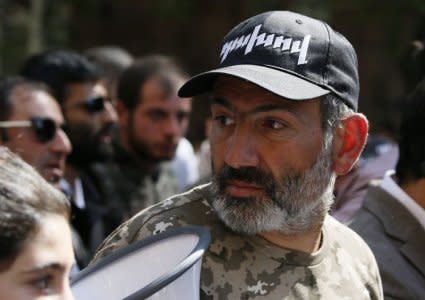Armenian politician who forced PM's resignation leads thousands in march

Thomson Reuters
By Margarita Antidze and Hasmik Mkrtchyan
YEREVAN (Reuters) - A politician who forced Armenia's prime minister to resign led thousands of people on a march on Tuesday to mark the anniversary of Ottoman Turk massacres of Armenians in 1915, cementing his growing political stature.
Prime Minister Serzh Sarksyan resigned on Monday after almost two weeks of street protests prompted by accusations he had manipulated the constitution to cling to power.
Lawmaker Nikol Pashinyan played an instrumental role in ousting Sarksyan, organizing many of the protests and calling for the premier to go in a televised exchange before being jailed and then released. He is set to start talks with the ruling party on Wednesday.
On Tuesday, Pashinyan led thousands of people through the capital Yerevan to a hilltop memorial dedicated to the victims of the 1915 massacres. Some chanted his name and waved the national flag.
Armenia say the killings during World War One constituted genocide. Muslim-majority Turkey accepts that many Christian Armenians were killed in fighting during the war but denies the killings amounted to genocide.
Given the anniversary's solemn nature, politicians decided to largely refrain from making political statements about the country's future on Tuesday.
But acting prime minister Karen Karapetyan, an ally of the ousted Sarksyan, said it was important to stay united amid the political tumult.
"We are going through a very difficult stage in our new history...demonstrating to the entire world that despite difficulties and unresolved problems we are united," Karapetyan said in a statement after laying flowers at the memorial to the victims of the massacres.
"We reaffirm our determination to build strong statehood and a free and civilized society."
Sarksyan's allies like Karapetyan remain in important positions in government and it remains unclear whether his resignation will herald any real change.
Armenia's political parties in parliament must now put forward the name of a new prime minister within seven days.
Pashinyan, 42, appears keen to play a major role in the political reconfiguration.
He has a history of political activism and was among opposition activists who demonstrated against Sarksyan's 2008 presidential election victory. Ten people were killed in clashes that followed that win.
After a period of hiding, Pashinyan surrendered to the police in 2009 and was sentenced to four years in prison for organizing civil disturbances. He was released two years later under an amnesty.
"Nikol is a really popular leader, whom we trust," Karen Mkhitaryan, a 19-year-old student, said of Pashinyan.
PROSPECTS UNCLEAR
Politicians and experts said on Tuesday that Sarksyan, who was president for a decade before trying to extend his time in power, decided to step down due to what they described as unbearable pressure coming from the mass protests.
"Thousands of people were in the streets for days demanding his resignation and the moment came when he had no resources to suppress this movement," Ararat Mirzoyan, an opposition leader, told Reuters.
Some said Sarksyan's move was a rare example of political wisdom from a leader under pressure.
"Serzh Sarksyan has confirmed once again that he is a real statesman," Eduard Sharmazanov, a vice speaker of parliament, told Reuters.
Others praised him for not resorting to a bloody crackdown to stay in power, something he had hinted at on Sunday.
Sarksyan was a close ally of Russian President Vladimir Putin and Moscow is closely watching events in Armenia, where it has two military basesy. The Kremlin said on Tuesday it was pleased the situation appeared stable for now.
Many experts say it is too early to predict what lies ahead however.
"What is needed is a sober power-sharing reconfiguration," said Richard Giragosian, a director of the Regional Studies Centre.
"Yet such consensus and compromise seems very far away, and with mounting expectations and anger dangerously high, the real challenge of governance is only just beginning."
(Writing by Margarita Antidze/Andrew Osborn; editing by Angus MacSwan)
See Also:

 Yahoo News
Yahoo News 
